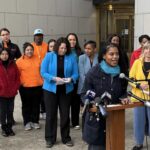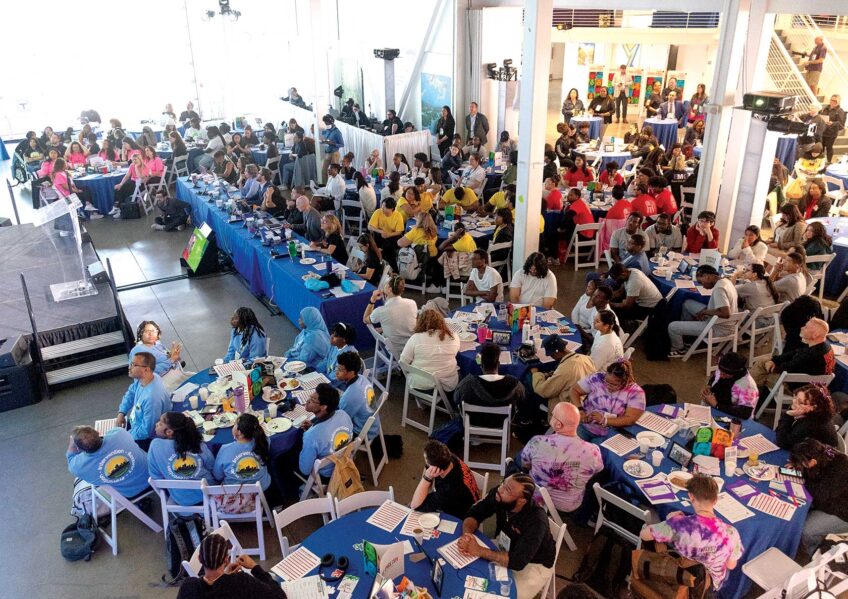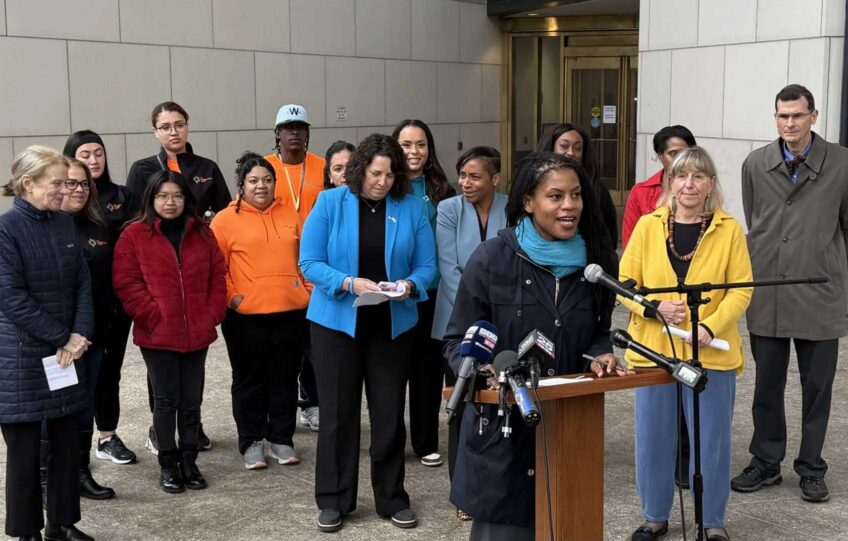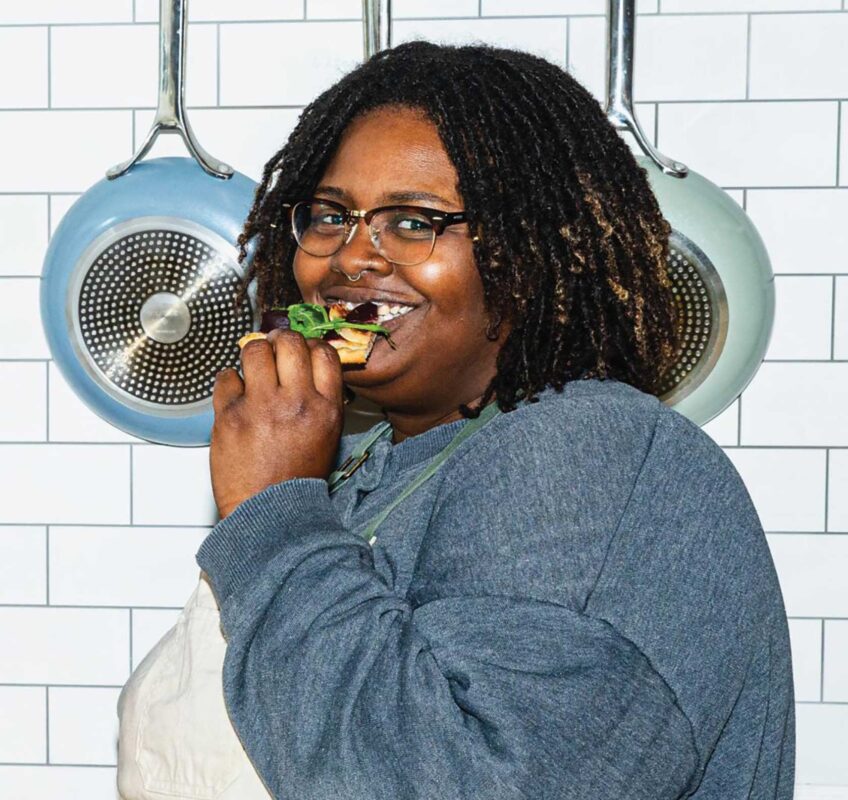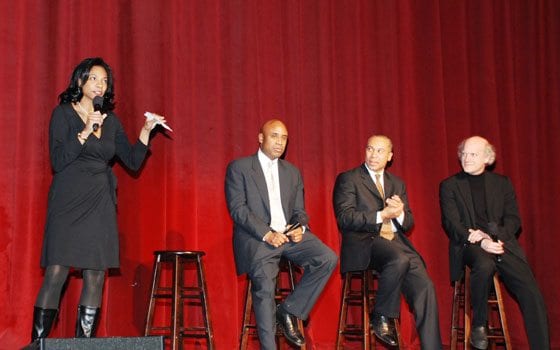

Author: Bill BrettBay State Banner arts writer Robin Hamilton (left) moderates a question-and-answer period featuring Gov. Deval Patrick (third from left) and two of the filmmakers behind “The Black List: Volume Two,” executive producer Tommy Walker (second from left) and director Timothy Greenfield-Sanders (right), following the East Coast premiere of the hour-long HBO documentary, held Wednesday evening, Feb. 18, 2009, at the Strand Theatre in Dorchester.

Bay State Banner arts writer Robin Hamilton (left) moderates a question-and-answer period featuring Gov. Deval Patrick (third from left) and two of the filmmakers behind “The Black List: Volume Two,” executive producer Tommy Walker (second from left) and director Timothy Greenfield-Sanders (right), following the East Coast premiere of the hour-long HBO documentary, held Wednesday evening, Feb. 18, 2009, at the Strand Theatre in Dorchester.

Author: Bill BrettBay State Banner arts writer Robin Hamilton (left) moderates a question-and-answer period featuring Gov. Deval Patrick (third from left) and two of the filmmakers behind “The Black List: Volume Two,” executive producer Tommy Walker (second from left) and director Timothy Greenfield-Sanders (right), following the East Coast premiere of the hour-long HBO documentary, held Wednesday evening, Feb. 18, 2009, at the Strand Theatre in Dorchester.
Four strobe lights announced last Wednesday night’s East Coast premiere of “The Black List: Volume Two,” an hour-long documentary featuring conversations with influential African Americans about their experiences of growing up black in America.
Gov. Deval Patrick, one of the 15 people interviewed in the film, joined a crowd of 800 viewers at the Strand Theatre in Dorchester for the premiere. His appearance on the screen — against a slate grey backdrop, dressed in a simple dark suit and speaking directly into the camera — garnered cheers and applause from the audience.
In the film, Patrick — whom “The Black List” director Timothy Greenfield-Sanders called “the most powerful African American political figure in the country” before the election of President Barack Obama — speaks of the emotions he felt watching Obama accept the Democratic presidential nomination last August.
“I fell apart,” Patrick says, describing the tears that ran down his face as Jennifer Hudson sang the national anthem, because “all those concepts [contained in the anthem] had a different meaning on that day.”
Similarly powerful personal anecdotes make up the bulk of the film, which debuts for national cable audiences on HBO this Thursday night at 8 p.m. Journalist Elvis Mitchell engages his interview subjects in conversations that reveal not only their triumphs and vulnerabilities, but often also their earnestness and senses of humor.
Patrick speaks also of how his 5-year-old daughter was asked to write about the four seasons for a school assignment. The governor says she began her description with, “First you drive up and the chauffeur takes your car.”
She was describing her experience at the Four Seasons Hotel in Washington, D.C., Patrick explained. His amused expression also communicates amazement that a boy who grew up on the South Side of Chicago would one day have children for whom luxuries like chauffeurs and five-star hotel stays were not at all unusual.
“One generation,” Patrick emphasizes with wonder in his voice, leaning into the camera as the image on the screen fades to the next interview.
The film’s aesthetic is spare and simple. Each individual profiled faces the camera and speaks directly to the audience, their facial expressions, gestures and mannerisms all highlighted by the proximity and angle of the shot.
Fashion designer Patrick Robinson, who now heads the design team at clothing retail giant Gap Inc., moves his hands with frenetic energy as he speaks, while evangelical pastor T.D. Jakes exudes serenity as he leans back in contemplation.
Hip-hop artist and producer RZA smiles shyly as he talks about his passion for chess, and how his status as rap’s chess champion is signaled by his possession of a “Mike Tyson-type belt.” Actor Laurence Fishburne describes an awkward conversation at the supermarket with a laugh that is a revelatory cross between a chuckle and a giggle.
The audience at the Strand responded to each profile with enthusiasm, but also reserved special approval for certain faces. Besides cheering when the governor appeared on screen, the crowd welcomed filmmaker Tyler Perry’s interview with applause, many nodding sympathetically during the description of his troubled childhood and teenage years.
Kara Walker earned a round of laughs with her description of the challenges of being a black artist. With an impish grin, Walker notes, “If you’re a black artist, you could paint a wall of smiley faces and somebody would ask you, ‘Why are you so angry?’”
Jakes drew loud support with his observations on faith and race, particularly his wish that people would view faith as a source of inspiration to “fuel our dreams rather than anesthetize our disappointments.”
“I believe that God raises up the most unlikely of people to show us that we can do anything,” says Jakes, who told PBS in an interview in 2000 that he was thought unlikely to ever become a preacher because of his lisp. As his image faded and the audience burst into applause, he noted, “I am one of those people.”
Mitchell’s interview with physician Valerie Montgomery Rice, dean of historically black Meharry Medical College in Nashville, Tenn., also struck a chord with the crowd. During her segment, Montgomery Rice notes that black women have a higher mortality rate from breast cancer and lung cancer than other women.
“It extends beyond access [to health care],” she says. “It’s about making sure people don’t have to walk 10 miles to get fresh fruits and vegetables.”
The film takes its title from Mitchell’s desire to question the negative connotations associated with the word “black” and the idea of a “black list.” Patrick echoed that notion during a question-and-answer period following the screening that was hosted by Bay State Banner arts writer Robin Hamilton.
Patrick voiced his enthusiasm for the project, which began with a series of interviews released as “Volume One” last year and continues at www.blacklistproject.com.
“We need a way to show our kids, all kids, that achievement is a part of our legacy,” Patrick said. “And [in this film] that came through loud and clear.”



